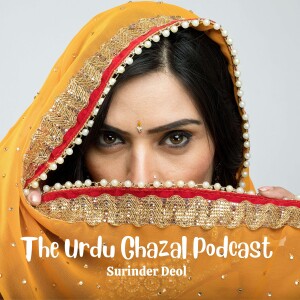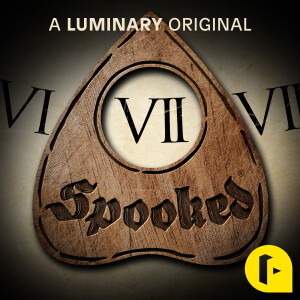

The Urdu Ghazal Podcast
https://feeds.buzzsprout.com/1976917.rssEpisode List

The Urdu Ghazal Podcast, Season 5 Episode 19: Majrooh Sultanpuri
Send us a textMajrooh Sultanpuri (1919-2000) was one of Urdu literature's most celebrated poets and a prominent lyricist in Hindi cinema. Born as Asrar ul Hassan Khan in Sultanpur, Uttar Pradesh, he adopted the pen name ‘Majrooh’ (meaning ‘wounded’), which reflected the melancholic undertones often found in his work. He began his literary career as a progressive poet, deeply influenced by the Progressive Writers' Movement in Urdu literature. His early poetry dealt with themes of social justice, love, and human suffering, earning him recognition in literary circles. He was particularly known for his ghazals and nazms that captured the essence of human emotions with remarkable sensitivity. In the 1940s, Majrooh transitioned to writing lyrics for Bollywood films, where he achieved tremendous success. He collaborated with legendary music directors like Naushad, S.D. Burman and R.D. Burman created memorable songs. His film songs retained the literary quality of his poetry while appealing to mass audiences. Majrooh wrote lyrics for over 300 films during his career and received several awards, including the Filmfare Award for Best Lyricist multiple times. Beyond cinema, he remained committed to Urdu poetry throughout his life, publishing several collections of his work. He passed away in 2000, leaving behind a rich legacy that bridged classical Urdu literature and popular culture.

The Urdu Ghazal Podcast, Season 5 Episode 18: Parveen Shakir
Send us a textParveen Shakir (1952-1994) was one of the most celebrated Urdu poets, known for her distinctive feminist voice and innovative approach to ghazal poetry. Born in Karachi, she earned a Master's degree in English Literature and later worked as a civil servant in the Pakistani government. Shakir published her first poetry collection, "Khushbu" (Fragrance), in 1976, which immediately established her as a significant literary voice. Her subsequent collections included "Sad-barg" (1980), "Khud Kalami" (1990), and "Maah-e-Tamaam" (1994). Her poetry was groundbreaking for its frank exploration of women's emotions, desires, and experiences in a predominantly male literary tradition. Her work earned numerous awards, including the Pride of Performance, Pakistan's highest literary honor, posthumously in 1999. Tragically, she died in a car accident in 1994 at the age of 42, cutting short a brilliant career. Today, she is remembered as a pioneering voice who transformed Urdu poetry by bringing authentic feminine expression to classical forms, inspiring generations of poets and readers across South Asia.

The Urdu Ghazal Podcast, Season 5 Episode 17 --Jan Nisar Akhtar
Send us a textJan Nisar Akhtar (1914-1976) was a distinguished Urdu poet, lyricist, and writer who left an indelible mark on modern Urdu literature and Indian cinema. Born in Gwalior, he came from a literary family and developed his poetic sensibilities at an early age.Akhtar was known for his progressive ideals and was associated with the Progressive Writers' Movement. His poetry reflected a social consciousness, humanism, and a profound concern for the struggles of ordinary people. He wrote extensively in various forms, including nazms (free verse poems) and ghazals, with themes ranging from love and romance to social justice and political awareness.In addition to his literary work, Jan Nisar Akhtar made significant contributions to Indian cinema as a lyricist and screenwriter. He penned memorable songs for numerous Bollywood films, bringing poetic elegance to popular cinema. His film lyrics retained the literary quality of his poetry while appealing to a mass audience. His works include several poetry collections, and his writings continue to be celebrated for their lyrical beauty, social relevance, and artistic merit.He passed away in 1976, leaving behind a rich corpus of work that continues to inspire readers and writers in the Urdu literary world.

The Urdu Ghazal Podcast, Season 5 Episode 16: Ahmad Faraz
Send us a textAhmad Faraz (1931-2008) gained prominence for his passionate ghazals and progressive poetry. His distinctive style blended classical Urdu poetry traditions with contemporary themes. What he wrote was characterized by romantic intensity, social consciousness, and political resistance. His verse focuses on love, loss, and human dignity, while also addressing issues of social justice and political oppression. Some of his most famous poetry collections include Tanha Tanha and Dard-e-Ashob. His ghazal Ranjish Hi Sahi became particularly iconic and was popularized through Mehdi Hassan's rendition.During General Zia-ul-Haq's military regime, Faraz faced persecution for his progressive views and spent several years in self-imposed exile in London, Canada, and Europe. His resistance poetry during this period earned him great respect among both intellectuals and the general public.Faraz received numerous awards, including the Pride of Performance (1989) and Hilal-e-Imtiaz (2004). He passed away in Islamabad in 2008, leaving behind a rich legacy that continues to influence Urdu literature. His poetry remains widely read and recited, particularly his verses on love and social justice, which resonate across generations.

The Urdu Ghazal Podcast, Season 5 Episode 15 --Faiz Ahmad Faiz
Send us a textFaiz Ahmad Faiz (1911-1984) was one of the most celebrated and most loved Urdu poets of the last century. Faiz began his literary career in the 1930s and became associated with the Progressive Writers' Movement, which sought to use literature as a tool for social reform. His poetry masterfully combined classical Urdu literary traditions with revolutionary themes, addressing issues of social justice and political oppression. He served in the British Indian Army during World War II, and then worked as a journalist and editor for various publications. After independence, his leftist politics brought him into conflict with the military government. He was imprisoned from 1951 to 1955 on charges of conspiracy against the state, during which time he wrote some of his most powerful poetry. Faiz spent years in exile during the 1960s and 1970s, living in Lebanon, Moscow, and London. He received numerous honors, including the Lenin Peace Prize in 1962. His verses, particularly "Hum Dekhenge" (We Shall See), became anthems of resistance across South Asia. Faiz's work transcended political boundaries, earning him recognition as a poet who gave voice to the oppressed while maintaining the highest artistic standards. He died in Lahore in 1984, leaving behind a legacy that continues to inspire poets and activists worldwide.Surinder Deol published an authoritative commentary on Faiz’s life and his work titled FAIZ: From Passionate Love to a Cosmic Vision with a Foreword by Professor Gopi Chand Narang (Rupa Publishers, 2021). The book is available from Amazon and other online book sellers.
You may also like
Create Your Podcast In Minutes
- Full-featured podcast site
- Unlimited storage and bandwidth
- Comprehensive podcast stats
- Distribute to Apple Podcasts, Spotify, and more
- Make money with your podcast












